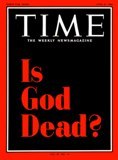
Forty-eight years ago this month, April 8, 1966, to be exact, Time magazine published what may be the most famous cover in its celebrated history. It consisted of a plain three-word question, printed in a bright blood red on an all-black background: Is God Dead?
At the time, believers read the headline as either blasphemy, an apocalyptic announcement or a declaration of war. Atheists and other secularists heard the death knell for all religion. To them, it was confirmation that the relentless march of reason and science had finally crushed the last vestiges of faith, superstition and irrational belief.
As many commentators have pointed out, those who rejoiced in the headline were sorely mistaken. Poll data consistently shows that belief in God is very much alive and well. But hold on: there's a lot more to the story.
The actual article in that Time issue made no dramatic predictions. Nor was the headline intended as a declarative statement about God or belief or anything else, as the question mark should have made perfectly clear. In fact, for a mass market piece on religion, the text is remarkably nuanced, and the reporters were perceptive enough to identify a trend that was about to explode. What the article actually described was a struggle among scholars, religious leaders, and ordinary people alike to rethink and redefine what we mean by God, and it saw that the search was on for new ways to pursue the timeless yearning to know the Infinite. "The new approaches to the problem of God," said Time, may (among other possibilities) "lead to a more realistic, and somewhat more abstract, conception of God."
And that, it seems clear, was exactly what happened. Polls may show that upwards of 90 percent of Americans check the "yes" box when asked if they believe in God. But when they are asked what they mean by God, it turns out that what was dying back in 1966 was God as the cloud-dwelling, white-bearded male overseer in Michelangelo's classic image. As it happens, in subsequent decades that anthropomorphic deity has largely been replaced by a conception of the Divine that's more akin to The Force of Star Wars, or a coherent energy like something physics might describe, or the Brahman of Hinduism -- formless, eternal and transcendent, and yet also imaginable in any number of forms.
The Time reporters were tuned into the zeitgeist. In the spring of 1966, baby boomers were in high school and college. They were the best-educated generation in history, and they also had plenty of spending money, free time, and unprecedented access to information, thanks to postwar advances in communication and technology. They also had free-thinking role models: the beatniks, the hippie vanguard, the early adopters of LSD, the political activists and others for whom "question authority" was a mantra.
And speaking of mantras, the West also had easy access to Eastern wisdom for the first time. The Beats had ushered Zen onto the scene; the Hare Krishnas had become a fixture in be-ins and other counterculture happenings; Yoga and Transcendental Meditation classes were cropping up on campuses; George Harrison had put a sitar riff on "Norwegian Wood" and was about to be mentored by Ravi Shankar, setting the stage for the Beatles' historic sojourn in India; and books by interpreters of Hinduism and Buddhism, like Alan Watts and Aldous Huxley, were making the rounds, along with the Bhagavad Gita, Zen Flesh, Zen Bones, the East-infused novels of Herman Hesse and J.D. Salinger, and Paramahansa Yogananda's Autobiography of a Yogi.
All in all, conventional religious beliefs were being called into question as never before, and the search for answers was not confined to the young; large numbers of grownups were also questioning what they had been taught about God. People were discovering new ways of understanding and pursuing spirituality, and adopting new language to discuss it , often eschewing the very word "God" because it was laden with connotations they wished to leave behind.
Time was onto something with that cover story four dozen years ago, but not exactly what most people who cite it -- and it has been cited thousands of times -- think it was saying. It foresaw a religious revolution marked by the emergence of an independent, pluralistic, non-dogmatic, spirituality whose ramifications we won't fully fathom for quite a while. That process continues, taking on new forms all the time. Probably, the best answer to the question in that long-ago headline should have been: it depends on what you mean by "God" and "dead."
